|
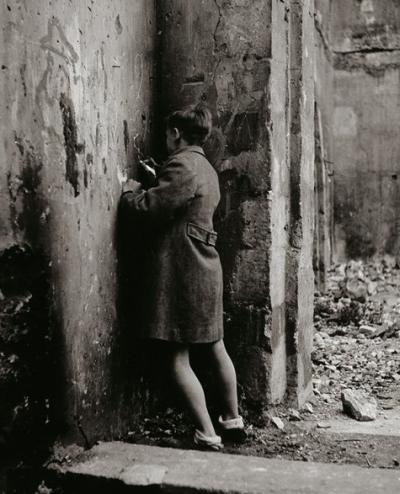
Brassaï
1899 - 1984
_______________________
Kulterer
A Tale
Thomas Bernhard
translated by Douglas Robertson
The Philosophical Worldview Artist
(....) Out of boredom, and because otherwise he would inevitably have succumbed to despair, he would often read aloud to himself tales and stories of his own invention and composition—“The Cat,” for example, or “The Dry Dock,” or “The Swimming-Birds,” or “The Landlady of the Inn’s Manageress,” “The Death Bed.” The ideas for these stories came to him mostly at night, and in order not lose them he had to get out of bed in the dark and, while his cellmates were sleeping, to sit down at the table, and, in the midst of that “dreadful darkness,” to jot down what had just occurred to him. Moreover it seemed to him that for the time being he would be unable to write down an entire story all the way to the end without rather lengthy preparation beforehand, and this pleased him, because his stories did not admit of being interrupted by any kind of incident; he had once had to break off in the middle of a story because one of the three inmates with whom he lived in the cell had taken notice of him and brutally hissed him away from the table, and the story had been lost. But over time he had developed a method of getting up from his pallet and sitting down at the table so soundlessly that they did not perceive him even when they were hardly fast asleep. There was hardly ever a night, and in the past year-and-a half pretty much not a single further night, in which he had not been awoken by an idea or at least by a thought, by a hint of a thought. He called his writing “my pastime,” and it came to him the way dreams come to other people, and it was for him as fragile as a dream.
...(more)
_______________________

photo - mw
_______________________
worksheet , , unfinished draft
Bill Knott
1940 - 2014
Friday, March 7, 2014
POEM
That the acrobat would remain instead
In the burning hoop rather than complete
Their turn through it is a suspect thought. Why
Halt there in that residual nought wrought,
Assault that seary vortex, flarehenge shroud,
Round and red as Plath's ovenhead. Ghastly
Silhouettes of gaslight pervade our past;
Kindled images drenched in daguerre, ancient
To the point of banishment when evenings
Vanish in a similar coup, v-neck-deep in
Loinclothed caverns it's best to hide. ...
(....)
Charioted into that charred station, this
Stagey stasis verges on the absurd, what a coal
Crude farce, though objections to imperfection
Are part of the drama enacted by critics:
Obsolete the sole acrobat's illusive tiptoe
Teeter that flammable cameo concerns us;
How the spotlight is mottled in the star, blotched
By their performance marring each watched face.
Such sight must perpetuate what it sought
Or go astray: but is this status, this
Jumpcaught bit what our linear needs
To thwart its deliberately taut onslaught,
Swan somersault halted strid-air, though no
Continuation of the comedian
In that conflagration could be the true
Disruption, the correct avoidance of
Transcendence: it can't taunt that denouement
FX-splendiddy enough, unlike the way one's
Living beyond their years in splatter or
Pattern brings fit end to each leapt theft,
Though certainly one stalls its engulfment with
Curious realms of appalled affrights viz.
An astral body coined in light, the vaunt
Tumbler pauses there in their circ de solar
Auto da fe, feral fireball our drone
Missiles visit hourly to satisfy the spacious
Prey of the ticket window's demands:
...(more)
_______________________
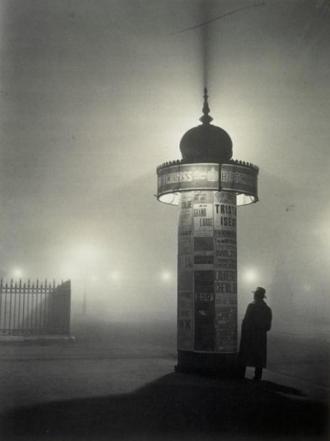
Brassaï
_______________________
To the Censorious Ones
Anne Waldman
(Jesse Helms & others...)
I'm coming up out of the tomb, Men of War
Just when you thought you had me down, in place, hidden
I'm coming up now
Can you feel the ground rumble under your feet?
It's breaking apart, it's turning over, it's pushing up
It's thrusting into your point of view, your private property
O Men of War, Censorious Ones!
get ready big boys get ready
I'm coming up now
I'm coming up with all that was hidden
Get ready, Big Boys, get ready
I'm coming up with all you wanted buried,
All the hermetic texts with stories in them of hot & dangerous women
Women with lascivious tongues, sharp eyes & claws
I've been working out, my muscles are strong
I'm pushing up the earth with all you try to censor
All the iconoclasm & bravado you scorn
All the taunts against your banner & salute
I'm coming up from Hell with all you ever suppressed
All the dark fantasies, all the dregs are coming back
I'm leading them back up now
They're going to bark & scoff & rage & bite
I'm opening the box
boo!
I'm coming up (PoemTalk #76)
Anne Waldman, 'To the Censorious Ones' ('Open Address to Senator Jesse Helms') Orchid Tierney, Stacy Szymaszek, Pierre Joris and Al Filreis
Anne Waldman at the Poetry Foundation and PennSound

Port en Normandie
1909
Georges Braque
b. May 13, 1882
_______________________
Wood
David Kinloch
Heartwood in softwood thought of Adam
and the chair back he gave the young gardener.
Sapwood in softwood remembered the shadow
cast by the apple on bark; springwood,
too young to recall much at all, imagined
the coming and going under the palm tree
at Timnah and corewood still felt the essential
pain of being bush in a world thinking itself
divine. Latewood allowed a final
sparrow to take its last blood red berry.
Then they shrugged and began to concentrate
on cell length, wall thickness, cellulose crystallinity.
Between them they wove their own myths
about moisture and fire, never took earth for granted.
poems
David Kinloch
Blackbox Manifold 7
David Kinloch at Poetry International and the Scottish Poetry Library
_______________________
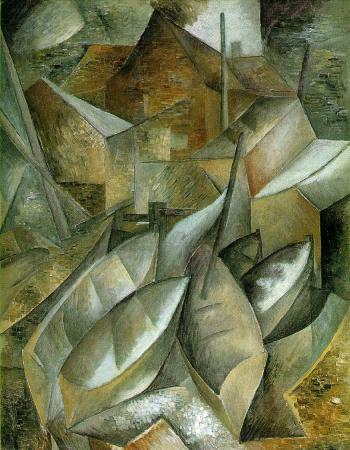
Fishing boats
Georges Braque
c.1909
_______________________
We, Who Are Different
by Veselin Markovic
translated by Ellen Elias-Bursac
asymptote
(....)
If the world had truly wanted to send me a sign, then a gale would have ripped off our roof and smashed all the windows. Or a silent earthquake would have roiled the lake, a massive wave would have flooded the town. Or lightning would have struck the tree stumps. Something simple and glaring, tempered to who I was at the time.
But since nothing like that ever happened, I was not braced for the tragedy.
...(more)
_______________________
Living Dada
A review of 'Irrational Modernism: A Neurasthenic History of New York ' by Amelia Jones
Adrienne Walser
jacket2
(....)
... when poet Eileen Myles enters a conversation about conceptual art and subjectivity in her May 2013 essay “Painted Clear, Painted Black,” she pulls on the threads of a conversation long under way. She enters by way of a comment made by Marjorie Perloff about her writing: that it is an example of “transparency or feigned transparency” in poetry. Myles deliberates on the meaning of “transparency,” and why it seems to be an objectionable thing. She wonders: is the rejection of an embodied subject behind the work a rejection of conflating author and art, of the lyric speaker, of an authentic self?
Myles also wonders if the call for an end of transparency is actually code for discomfort with identity politics, the feminine, the speech or bodies of women, queers, or people of color. In making the case that subjectivity and conceptualism are not incompatible, Myles reminds us that postmodern play is not necessarily at odds with the feeling (of) bodies of artists and audiences, and that subjectivity need not be simple or singular; nor is all conceptualist art disembodied. She understands the avant-garde to be “composed of a shaky grid holding a multiple of approaches” and notes in the “theory world outside of poetry, feeling is hot stuff.” I would add that not only has “feeling” been hot stuff in critical theory and literary studies for decades (what’s been called the “affective turn” happened around 2000), but visual and performance arts have a long history of interest in the body, feelings, and questions about reception. Myles identifies contemporary poets doing “unabashedly postmodern work that is free wheeling and exacting in its deployment of emotion” and reminds us that sound poetry is a bodily performance and that appropriation has served to mourn or mark a moment. Troubled by the misogyny in a conceptual writing process in which “womanly transparent feelings are now successfully marshaled into order,” Myles reminds us that in art there is feeling — “Feeling is an inside and outside gong. It’s history.”
I begin this review with Myles’s piece because I am struck by how much it resonates with Jones’s 2005 interdisciplinary art historical book, which revisits the early-twentieth-century New York City avant-garde by way of the recently rediscovered Baroness Elsa von Freytag-Loringhoven, whose biography and art illuminate this history of feelings and bodies working with and against cultural forces and aesthetic constraints. Because the life, body, and art of the Baroness were one and the same. Strangely and spectacularly ornamented and overflowing with what she scavenged from her street wanderings, she might, in the words of Jones, “help us understand how the messy, personal, and subjective have — in waves, beginning at least with the rise of identity politics in art world discourse in the late 1960s — begun to reemerge with increasing force to challenge the repressive boundaries of the restrictive patrilineal model of art practice and art history” (27). In Jones’s compelling alternative history of New York Dada, the Baroness is not simply an overlooked colorful character; nor is she a marginalized artist to be inserted into a preexisting narrative. She influenced avant-garde culture, inspiring, enacting, and creating innovative Dadaist art. Documenting her sharp wit and the sensual pleasure she took in interacting with the materials of her world, her exciting body of work includes and combines assemblage sculpture, sound poetry, visual poetry, painting, diagrams, fashion, and performance. As Dada embodied, the Baroness is a form of what Jones calls irrational modernism, and as such is representative of a new approach to understanding the historical avant-garde, one that “revises our current conception of radical artistic practice”.
...(more)
_______________________
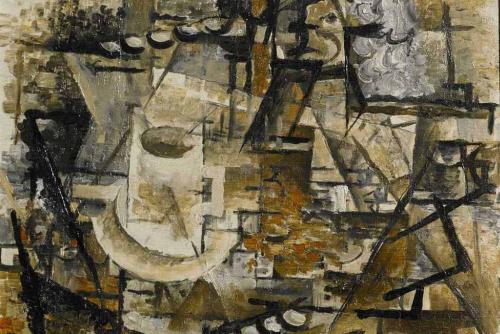
The Cup
Georges Braque
1911
_______________________
The Inhuman Turn: Poetry, Philosophy and Time
Craig Hickman
noir ecologies
(....)
The notion that rocks, stars, and the moon itself have a life of their own beyond us; that insects, whales, penguins, giraffes, bats, fungi, nuts, fruit, bark, sap, fiber, and shade among a myriad of other biochemical life forms that exist on our planet beyond us live lives unconcerned by our presence, or even oblivious to our self-importance, is for many of us a strangeness to be overcome. Jeffers once said that to even attempt this process, to begin our realignment with the earth and her creatures we’d need to accomplish specific procedures:
We must uncenter our minds from ourselves;
We must unhumanize our views a little, and become confident
As the rock and ocean that we were made from.
- Carmel Point
This notion of ‘uncentering our minds’ is a process of turning, of turning around, of forgetting and moving from the center to the periphery without the need for a return trip. It’s a process of opening ourselves to the flows of the great outdoors, to the noumenal realms beyond us that have for so long been locked away by the sheer force of the mind itself. Ever sense Kant poetry and philosophy have been locked in a mental cage, in the realm of the phenomenal in which everything was tinged with our mind’s presence, everything seemed as if for us. Our minds directed their sense of dependency on the phenomenal power of existence as if our life depended on it, what many have termed our finitude. ...(more)
_______________________

Next to the sea
Georges Braque
1958
_______________________
America's Class System Across The Life Cycle
a "charticle" from Matt Bruenig
Class haunts people from womb to grave, limiting their ability to flourish and pursue the good life as they define it. Confronted with the reality of our society’s entrenched class system, our national politics in its present state offers three responses. The first response is to deny reality altogether, usually in favor of an anecdote or two. The second is to accept that it exists, but pretend there is nothing you can do about it because those on the bottom are inferior (see Murray, Ryan). And the last response is to note it exists and offer lukewarm solutions that nibble around the margins of the problem without ever doing anything that might actually even things out.
...(more)

The Raven
c. 1840
Carl Spitzweg
1808 - 1885 Even the dream of a "better humanity" in which our children would "have a better life" is only a sentimental fantasy reminiscent of Spitzweg when it is not, at bottom, a dream of a better nature in which they would live.
-
Walter Benjamin: from Das Passagen-Werk, 1982
Carl Spitzweg: Back to BooksTom Clark Vanitas Magazine
_______________________
e-flux journal issue 55
The Octopus in Love
Chus Martinez
The octopus is the only animal that has a portion of its brain (three quarters, to be exact) located in its (eight) arms. Without a central nervous system, every arm “thinks” as well as “senses” the surrounding world with total autonomy, and yet, each arm is part of the animal. For us, art is what allows us to imagine this form of decentralized perception. It enables us to sense the world in ways beyond language. Art is the octopus in love. It transforms of our way of conceiving the social as well as its institutions, and also transforms the hope we all have for the possibility of perceptive inventiveness.
(....)
I still do not know exactly what to do about this incredibly beautiful image of a rainforest installed at the core of an art institution. It embodies all the difference in the world, separated from human agency and ideology, yet it also encapsulates the source of all that. It differs from the conventions of neutrality, and through its scale and its very nature it escapes from any formal canons. It compels a form of intelligence without consciousness to erupt into the white cube. “The rainforest,” as Ortiz has said, “is an element that really helps us to think about class and labor and autonomy and dependency, just introducing a radically different viewpoint, the viewpoint of the rhythm of moisture.”
In short, it seems very fertile to picture art that is outside the notion of culture. Can you imagine a white cube adopting a rainforest?
3. The Invention
The rainforest marks one of the multiple ends of the era of critical philosophy. Critical philosophy seeks necessary conditions or general foundations in order to determine possible relations. Instead of casting solid architecture, it casts doubt—an enormous parenthesis that allows us to avoid entering into the details of things. A museum emerging from a diasporic community that suffers from social and legal inequality could not possibly start by presenting itself as an “alternative” to modern institutions. There were no shared general conditions that could produce a “new modern Museo”—not enough social, political, or aesthetic consensus. Thus, in 1968, the Museo was not an alternative art space, but rather, through the rainforest, a true invention. This idea of invention is given the greatest importance by French philosopher Michel Serres. He defines philosophy as aspiring to give birth to a world of politics and professional ethics, rather than remaining crouched in an immovable position from which it either approves or condemns modernity or rationality—or the clarity of all discourse, for that matter.
...(more)
_______________________
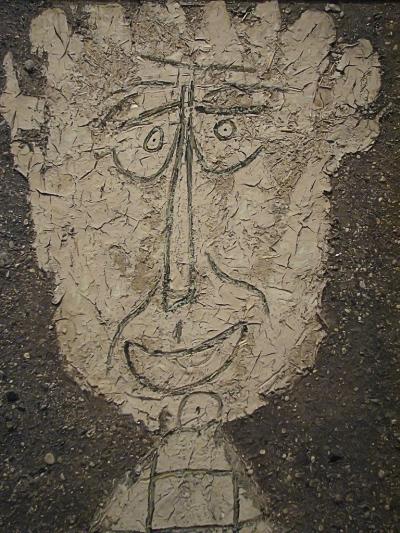
Jean Dubuffet
d. May 12, 1985
_______________________
Panic and the city
Arran James
open democracy
(....)
We all live within conditions that trigger mental health problems like anxiety disorders, regardless of whether we’re mental health workers or “service-users”.
Urban living takes place in what Paul Virilio has dubbed ‘the city of panic’. As far back as the work of George Simmel’s “Metropolis and Mental Life”, there has been a tradition of viewing panic as the outcome of bodies in a hyperstimulating urban environment. Hyperstimulation is the way in which our bodies, our nervous systems, have been coupled to a more or less permanent state of excitation.
(....)
What dawned on me then has since been confirmed by empirical studies and theoretical investigation: there was no apparent trigger to my panic attacks because they were caused by the capitalist city itself.
States and capital both understand this process. They regulate the rhythms of our lived bodies, both over-stimulating them and providing the means to de-stress. They expose our bodies to all kinds of corporeal vulnerabilities - sickness, homelessness, malnutrition - in order to make us into dependent bodies.
Sick bodies need doctors, exposed bodies need protection, and bodies assured they are kept safe are quiescent. The politics of panic allow the state to activate an infinite number of others as threats, whether they are external (terrorists), internal (the unemployed) or those who straddle these domains (immigrants).
When panic, or any other psychic arrhythmia, sets in, even your own body becomes suspect, volatile, in need of psychiatric and/or psychological biopolitical regulation.
Hyperaroused bodies welcome the medication that will fix their agitation. One of the “service-users” I recently worked with summed it up perfectly for me: “I want to be happily sedated”.
(....)
What is required is a politics capable of tackling the perceptual violence of overstimulation along with the other forms of violence within capitalism, such as sexism, racism, and transphobia, which we are already combating. We require a political therapeutics that is able to find militant forms of therapy and therapeutic forms of militancy.
Whatever else this praxis might look like, it will include the sharing of the wounds that we are all made to bear. It took me leaving my home city and travelling hundreds of miles away to Scotland to learn that. When I left, I left to be with someone that I'd fallen in love with. She was mad in a different way to my own madness. That relationship was my first experience of the sharing of wounds I would come to find with others.
Mental illness is one of the fallouts from life in the neoliberal city. The fight against capitalism is also the fight for our minds.
...(more)
_______________________
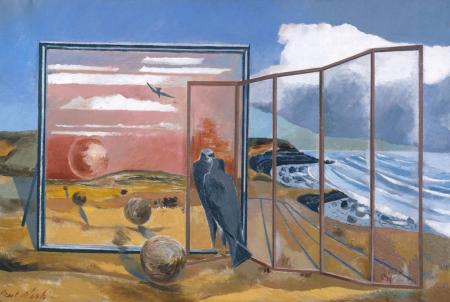
Landscape from a Dream
1936-8
Paul Nash
b. May 11, 1889
_______________________
Maurizio Lazzarato:
Subverting the Debt Machine
Interview by Antonio Alia, Loris Narda and Vincenzo Boccanfuso.
Translated and edited by Yari Lanci and Tom Vandeputte.
(....)
The economy of debt makes no distinction between waged workers and non-waged workers, between the employed and unemployed, between material and immaterial labour. We are all in debt. At the same time, the creditor-debtor relation has an immediately global dimension, which transversally commands and acts on all divisions between rich and poor countries, established and developing. Debt has been the fundamental weapon of the capitalist strategy since the 1970s, one that has completely displaced the terrain of class struggle at a social and a global level, and that we still find difficult to address today.
(....)
I think that the concept of language and of the linguistic turn in analytic philosophy have created large problems, because they refer to a process of subjectivation that is in my view not materialist. In capitalism, subjectivation always takes place for and with the technical and social machine. Capital is a social relation, a relation of power, but one that is ‘assisted’ by social and technical machines. That is precisely the specificity of capitalism. Capital is not merely a relation between ‘humans’, an intersubjective relation as in Hannah Arendt (or Rancière), where action lacks any element of ‘matter’. We need to stay ‘loyal’ to Marx’ ‘Fragment on Machines’. For these reasons I think that the political subjectivation found in Badiou and Rancière is ‘idealistic’. In Badiou, the class struggle is thought in abstract terms – mathematics is his anthology. Badiou and Rancière refer to economy as if it were the other of politics, whereas the political is always being redefined by the economy. Capitalism is nothing but this. ‘Our destiny is the economy’ – that is a power relation, a relation between those who manage power and those who are subjected to it, and where those who are subjected have the possibility to revolt, to overthrow the situation. Subjectivation does not occur around democracy as a given, but starts from machinic processes of exploitation and domination that become democratic through struggles.
...(more)
THE NEW READER #1
The first issue of The New Reader focuses on debt as a theme in current philosophy and critical theory. Released in two parts, this initial instalment sets off with an essay by Richard Dienst, which maps out the discourse on debt and the distinct conceptual models it relies on. The following three contributions address a pivotal recent intervention on the topic: Maurizio Lazzarato’s book The Making of the Indebted Man. Each of these texts attempts to frame, elaborate or problematise the thesis central to this book: that the concept of ‘indebtedness’ does not only characterise an increasingly generalised economic situation, but also marks a form of subjectivity central to our present condition.
via Noir Ecologies
_______________________

"The Frightening Road Home"
Rokuro Taniuchi
(1921-81)
Roku Redux
50watts
_______________________
Regrets
John Tottenham
I don’t understand people
who claim that they have no regrets in life;
who insist, out of gratitude, pride or ignorance,
that they wouldn’t want to change a thing.
My life is a raging river of regret, flowing
into a sea of shame. There is very little
I wouldn’t do differently if given a second chance.
I always knew I’d end up feeling this way:
It was a setup. Regret was something
I worked towards, something I felt I had to earn.
And now, naturally, I regret that too.
via Forgottenness
_______________________

Edward Lear
b. May 12, 1812

Landscape in Graubünder
with sun rays
Ernst Ludwig Kirchner
b. May 6, 1880
_______________________
Well Water
Randall Jarrell
b. May 6, 1914
What a girl called “the dailiness of life”
(Adding an errand to your errand. Saying,
“Since you’re up . . .” Making you a means to
A means to a means to) is well water
Pumped from an old well at the bottom of the world.
The pump you pump the water from is rusty
And hard to move and absurd, a squirrel-wheel
A sick squirrel turns slowly, through the sunny
Inexorable hours. And yet sometimes
The wheel turns of its own weight, the rusty
Pump pumps over your sweating face the clear
Water, cold, so cold! you cup your hands
And gulp from them the dailiness of life.
_______________________
The Fire Sermon
Joshua Clover
Lana Turner
2. Transistor
for Ruth Jennison
There will be a revolution or there will not. If the latter these poems were nothing
but entertainments. If the former it will succeed or fail. If the latter these poems
were better than nothing. If the former it will feature riots fire and looting and these
will spread or they will not. If the latter these poems were curiosities. If the former it
will feature further riots manifestos barricades and slogans and these will leap into
popular songs or they will not. If the latter that’s that. If the former these popular
songs will be overcome or they will not. If the latter these poems were no different
than the songs. If the former the popular itself will be abolished via riots barricades
manifestos occupations and fire or it will not. If the latter we will spend several
more decades talking about culture. If the former the revolution will at this point be
destroyed from within or without. If the latter these poems went down fighting. If
the former it will feature awful confrontations with former friends and there will be
further manifestoes new slogans ongoing occupations and communes and lovers
will be enemies. We do not know what will happen after this point but surely this is
enough to draw some preliminary conclusions. The poem must be on the side of
riots looting barricades occupations manifestos communes slogans fire and enemies.
...(more)
_______________________

Francisco Bores López
_______________________
Our sad “Mad Men” revolution:
How consumerism co-opted rebellion
Talking revolution with Lewis Lapham -- and how capitalism manages to keep coming out on top
Thomas Frank
(....)Lewis Lapham
... the idea is that a democratic society is interested in equality. That’s the way we deal with each other in a democratic society. That’s the way you deal with people 90 percent of your day. That’s the way you deal with people you know, that’s the way you deal with people you help across the street. The munificence, the generosity of the American spirit, of the democratic spirit, is in plain sight all day, every day.
A capitalist economy is not interested in equality. I mean, the whole idea of a capitalist economy is buy cheap and sell dear. Equality is an utterly alien notion to a bank. And the people who drew up the American Constitution tried to find a way of balancing those two impulses or whatever you want to call it — motions of the spirit and the heart — and the balance has fallen way out of line so that we now have, pretty much, a country being run by the monied interests. This has happened in history. Aristotle talks about it. The same thing. I can’t remember the exact sequence, but at some point an oligarchy becomes so stupid and self-serving that it’s like cheese and it turns rancid in the sun. And that’s what we have now. That’s what they had in the Ukraine. That’s what they had in Russia after coming down under the dispensation of Mr. Yeltsin. That’s what happened in the end to the ancien regime in France. It will happen here. But it’s not going to happen by the storming of the Bastille or a march on the Pentagon.
...(more)
_______________________
The American Revolution Reborn
Common-Place VOL. 14 · NO. 03 · Spring 2014
_______________________
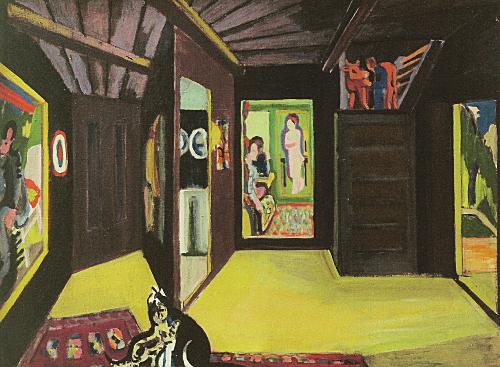
Mountain Atelier
Ernst Ludwig Kirchner
c.1937
_______________________
Any Old Business? Ere Mine Errs Wer E'en O'er...
Brad Zellar
Your Man For Fun In Rapidan
(....)
By this point I'm just going to assume that you have no idea what I'm talking about. Which is fine, but consider this: What is Ike Quebec --whose music is playing in the background as I type-- doing right this moment, a moment that has sustained itself and been replaying over and over (if only hypothetically, but, make no mistake, I am hearing a dead man breathing) for fifty years now? What is he doing if not going down a river?
The wonders of recorded sound and all art, all preservation that, in one way or another, moves: You can just keep sending these boats down the river --the same river, yet, in both Heraclitian and literal terms, a different river-- again and again and again. And fifty years from now some poor fool, similarly addled as myself, will still be able to put Ike Quebec's boat in the water and listen to it go. The same fool could also launch any one of the boats from the foxed fleets of, say, Henry James or Henry Adams, William Trevor or William James, and every one of them would still float and still take the fool somewhere else.
And now I'm thinking of all the ghost boats on my shelves, continually going down the river, or waiting to go back down the river. The ghosts don't even have to paddle anymore; long, long ago (or maybe not that long ago) they built their boats out of words and sound, put them in the water, and the river carries them still.
The thing is, I guess, is that I always wanted to build boats that would still be going down that river when I'm gone, even if they spend the rest of forever traveling exclusively under the cover of darkness. Even if they're just docked on some lonely stretch of backwater, a lone lamp burning in the cabin into the wee hours, waiting for one more launch, one more trip back into the dreaming world that is the river.
...(more)
_______________________

Windmill landscape
Francisco Bores López
b. May 6, 1898
_______________________
Children Selecting Books in a Library
Randall Jarrell
With beasts and gods, above, the wall is bright.
The child's head, bent to the book-colored shelves,
Is slow and sidelong and food-gathering,
Moving in blind grace ... yet from the mural, Care
The grey-eyed one, fishing the morning mist,
Seizes the baby hero by the hair
And whispers, in the tongue of gods and children,
Words of a doom as ecumenical as dawn
But blanched like dawn, with dew.
The children's cries
Are to men the cries of crickets, dense with warmth
-- But dip a finger into Fafnir, taste it,
And all their words are plain as chance and pain.
Their tales are full of sorcerers and ogres
Because their lives are: the capricious infinite
That, like parents, no one has yet escaped
Except by luck or magic; and since strength
And wit are useless, be kind or stupid, wait
Some power's gratitude, the tide of things.
Read meanwhile ... hunt among the shelves, as dogs do, grasses,
And find one cure for Everychild's diseases
Beginning: Once upon a time there was
A wolf that fed, a mouse that warned, a bear that rode
A boy. Us men, alas! wolves, mice, bears bore.
And yet wolves, mice, bears, children, gods and men
In slow preambulation up and down the shelves
Of the universe are seeking ... who knows except themselves?
What some escape to, some escape: if we find Swann's
Way better than our own, an trudge on at the back
Of the north wind to -- to -- somewhere east
Of the sun, west of the moon, it is because we live
By trading another's sorrow for our own; another's
Impossibilities, still unbelieved in, for our own ...
"I am myself still?" For a little while, forget:
The world's selves cure that short disease, myself,
And we see bending to us, dewy-eyed, the great
CHANGE, dear to all things not to themselves endeared.
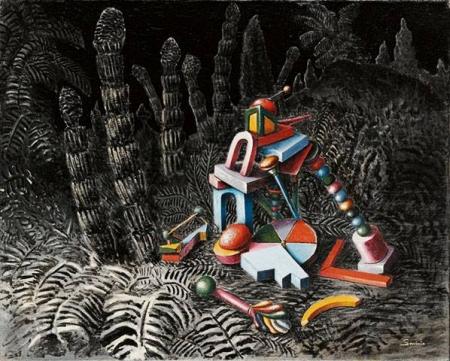
Nella foresta
1930
Alberto Savinio
d. May 5, 1952
_______________________
The Bill
Muriel Rukeyser
(....)
Words on a monument.
Capitoline thunder. It cannot be enough.
The origin of storms is not in clouds,
our lightning strikes when the earth rises,
spillways free authentic power:
dead John Brown’s body walking from a tunnel
to break the armored and concluded mind.
...(more)
The Book of the Dead
Muriel Rukeyser
(1938)
.....................................................
Defacing the monument
Rukeyser’s innovations in docupoetics
Susan Briante
jacket2
(....)
Rukeyser’s series of poems was a product of heightened interest in documentary forms prevalent during the 1930s. As critic William Stott notes, “a documentary motive was at work throughout the culture of the time: in the rhetoric of the New Deal and the WPA arts projects; in painting, dance, fiction, and theater; in the new media of radio and picture magazines; in popular thought, education, and advertising.”[3] Rukeyser believed that the poem had a particular power to represent current events, as well as to offer a specific view to them. As critic Shoshana Weschler explains, “For Rukeyser, poetry shares in common with science a heightened quality of vision: the imaginative capacity to recognize knowledge as process, and reciprocity and relationship as fundamental principles of being.”
The forces that drew Rukeyser to “extend the document” did not exert the same pull on other poets. In the years following World War II, both the New York School and Confessional poets turned inward instead of toward outward “processes.” Rukeyser and her work lost footing. Writing in 2003, poet and critic Kristin Prevallet notes Rukeyser’s work “is contemporaneous with the work of the Objectivist/Projectivists, and yet it is often omitted from discussions of the period.” Writers who continued in a documentary mode did not see Rukeyser as a forerunner. She corresponded with Robert Duncan and Charles Olson, and yet — as Eileen Myles observes — “she wasn’t passed down.” Myles, writing in The Nation in 1997, explained that Rukeyser was “barely represented in either the academic or the experimental poetic canon.”
...(more)
_______________________
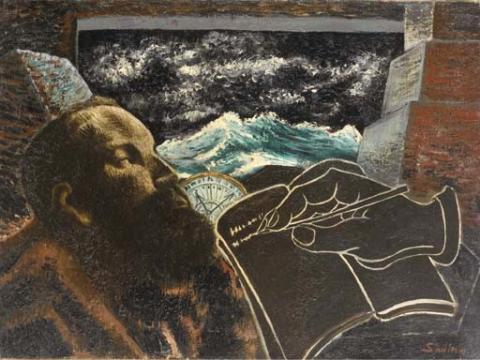
Alberto Savinio
_______________________
Technocapitalism: Time, Value, and Labor
Craig Hickman
noir realism
(....)
When it comes to sleeplessness we begin to see that in the new technocapitalism the perfect capitalist would ultimately take on machinic qualities, or even merge with the machine and become sleepless and timeless. The cyborgization of society has begun and we are the children of this new machinic age. But isn’t this madness? Of course it is. You might ask: What of the billions of organic humans who populate the earth? They remain, of course, but in the eyes of technocapitalism these biomechanicals have become completely superfluous and like time, disposable. As Crary remarks “there are vast numbers of human beings, barely at or below subsistence level, who cannot be integrated into the new requirements of markets, and they are irrelevant and expendable. Death, in many guises, is one of the by-products of neoliberalism: when people have nothing further that can be taken from them, whether resources or labor power, they are quite simply disposable. However, the current increase in sexual slavery and the growing traffic in organs and body parts suggest that the outer limit of disposability can be profitably enlarged to meet the demands of new market sectors”. Have we entered Hell yet?
As the critic Henry Giroux recently said:
What marks the present state of American ‘democracy’ is the uniquely bipolar nature of the degenerative assault on the body politic, which combines elements of unprecedented greed and fanatical capitalism, called by some the New Gilded Age, with a new kind of politics more ruthless and savage in its willingness to abandon – even vilify – those individuals and groups now rendered disposable within ‘new geographies of exclusion and landscapes of wealth’ that mark the new world order.
Harsh words indeed. As Zygmunt Bauman comments, organic humans – or, what I term, biomechanicals have become ‘redundant’:
To be ‘redundant’ means to be supernumerary, unneeded , of no use – whatever the needs and uses are that set the standard of usefulness and indispensability. The others do not need you; they can do as well, and better, without you. There is no self-evident reason for your being around and no obvious justification for your claim to the right to stay around . To be declared redundant means to have been disposed of because of being disposable – just like the empty and non-refundable plastic bottle or once-used syringe, an unattractive commodity with no buyers, or a substandard or stained product without use thrown off the assembly line by the quality inspectors. ‘Redundancy’ shares its semantic space with ‘rejects’,‘wastrels’,‘garbage’,‘refuse’ – with waste. The destination of the unemployed, of the ‘reserve army of labour’, was to be called back into active service. The destination of waste is the waste-yard, the rubbish heap. ...(more)
_______________________
John Dewey and David Graeber:
Elements of Radical Democracy in Pragmatist and Anarchist Thinking
Martin Bartenberger
Abstract:
John Dewey's concept of democracy has often been dismissed as "liberal" and as being unable to account for pluralism. I argue that this is a misconception which can be corrected if we analyze Dewey's understanding of democracy in its historical context. Following this approach, we find elements of a democratic conception in Dewey's thought that are profoundly radical and that can be read along the lines of an anarchist account of radical democracy as recently developed by David Graeber.
In January 1937 Dewey published a little-known essay with the title "Democracy Is Radical". In this article he develops the position that democracy is radical because it puts "primary emphasis upon the means by which [...] ends are to be fulfilled". Only a few months later Dewey became chairman of the Commission of Inquiry into the Charges Made against Leon Trotsky in the Moscow Trials. His meetings with Trotsky in Mexico lead to a debate between the two thinkers on the role of means and ends for social transformation which seems to be almost forgotten now. Against Trotsky's account of a socialist revolution, Dewey again emphasized how means and ends are always closely connected. For social transformation this means that radical ends can only be reached through radical means: democracy.
The paper wants to bring this historical context to attention because this can help us to understand Dewey's concept of radical democracy for what it was: an intervention into the debate on the role of democracy for the left. I will critically discuss and evaluate the radical nature of Dewey's concept of democracy and reconstruct the historical context of its origin. The paper will further develop and defend the thesis that Dewey's concept of democracy is radical insofar as it was intended against an orthodox Marxist understanding of revolution and social transformation. I will conclude by outlining how this rejection of orthodox Marxism brings Dewey close to an anarchist account of radical democracy as it was recently formulated by David Graeber and by highlighting the parallels between Dewey's and Graeber's concepts of radical democracy when it comes to the priority of means over ends, the role of deliberation and the rejection of dogmatism.
Social Science Research Network
_______________________
Is this still capitalism?
McKenzie Wark
Public Seminar Commons
(....)
It seems to me that without some notional sense of both origins but also potential end-points, the concept of ‘capitalism’ risks becoming a bit too totalizing and ahistorical. Either in the mode of critique or the mode of analysis, research will be drawn to what appears continuous in the object of study, and not notice things that point towards transformations into something else.
‘Capitalism’ does indeed seem to be back as an analytic object. In my own little world, the ‘cultural turn’ treated too much interest in the mode of production as vulgar Marxism. So too did what one might call the ‘political turn’. In this year when both Stuart Hall and Ernesto Laclau have passed away, we might want to not forget what was valuable in the cultural and political turns, of which they are avatars. But at the same time, it is worth pointing out that both took the underlying economic form of capitalism to be more or less unchanged. What was interesting and new was at the cultural or political ‘level’ of the social formation.
The return of capitalism as an object comes at a time when both of the possible historical ‘grand narratives’ about its future have receded. Its hard to sustain much faith in bureaucratic socialist planned economies as any kind of alterative. Khrushchev did not bury us with ‘red plenty.’ Also in retreat are various ‘third way’ narratives about how capitalism has passed over into some more sophisticated world where class struggle and ideology are dead. And so, strikingly, the narrative imaginary that is most widely shared is that capitalism just goes on and on, getting worse or better, depending on one’s point of view.
...(more)
_______________________
The Pacification of the American Working Class: A Time Series Analysis
George S. Rigakos & Aysegul Ergul
_______________________
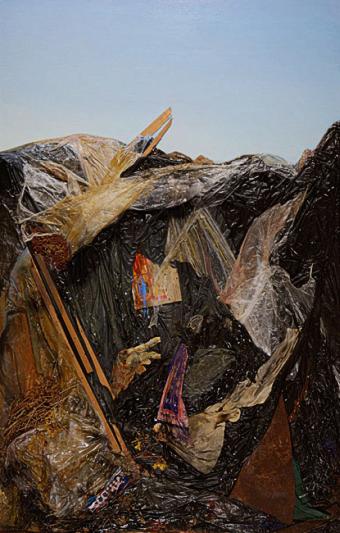
Piero Guccione
b. May 5, 1935
_______________________
Rune for the Parable of Despair
Deborah Digges
(February 6, 1950 - April 10, 2009)
Little left of me that year—I had a vision
I was strata, atmosphere.
Or it was that the host entire coded in my blood
found voice and shrieked, for instance,
at what we now call roads
and I must maneuver freeways, bridges with these inside me
falling to their knees beating the ground howling.
One might well ask why they’d come forward—
fugitives flushed from a burning house,
converts fed down the aisles,
bumping and blubbering their way into revival light,
light so eroding, the human face is abberation,
the upright stance a freak
with no means otherwise.
Some things won’t translate backwards.
Some things can’t be undone,
though it takes years to learn this, years.
Such were the serial exhaustions of my beliefs,
whatever drug worn off that must belong to youth,
or to the feminine, or simply to the genes begun a wintering.
Then I knew the purest bitterness,
as if my heart were a wrecking ball,
my love for the man an iron bell used of the wind,
calling to task a population,
calling them in, as from these fields,
before the stone wheel became speech,
before fire dropped from the sky to be caged and carried into the caves.
And so they came to be with me,
(....)
_______________________

July morning on the beach
Piero Guccione
1984
Rune for the Parable of Despair

Domenico Gnoli
Alberic the Wise and Other Journeys
Norton Juster
illlustrated by Domenico Gnoli
google books
More than many years ago when fewer things had happened in the world and there was less to know, there lived a young man named Alberic who knew nothing at all. Well, almost nothing, or depending on your generosity of spirit, hardly anything, for he could hitch an ox and plow a furrow straight or thatch a roof or hone his scythe until the edge was bright and sharp or tell by a sniff of the breeze what the day would bring or with a glance when a grape was sweet and ready. But these are only the things he had to know to live or couldn't help knowing by living and are, as you may have discovered, rarely accounted as knowledge. ...
_______________________
“If the young rested in their mad desire to injure themselves and others (even though the incessant doubts about what to do and rejection of the family and today’s way of life remain) and rather than poisoning themselves horribly, as we know, sought ecstasy and oblivion, along with daily doses – even heavy ones – of reason and beauty, then at night the cities would be full of whispering thinkers, people engrossed in their books, philosophers lurking around the corner…..
Somebody would die, in the early hours, from an overdose of awareness.”
- Guido Ceronetti
_______________________
New materialisms: Foucault and “ the Government of Things ”
Thomas Lemke
Academia.edu
_______________________
Nietzsche And The Burbs
A day like any other. An ordinary day, just like the others. But today is so ordinary, it is unlike the others. Today is the most ordinary day of all.
And isn't on such a day that you can touch the Day behind the day? Isn't it on such a day that you feel the un-Day, behind the day, that undoes all days from within?
The end of days, the ruin of days: names for Day that does not happen.
...(more)
_______________________
 What is a Monster? The Bat Cat
1967
Domenico Gnoli
b. May 3, 1933
_______________________
Metropolis, Media, Mechanosphere
Deterritorial Investigations Unit
There is a postfascist figure haunting our world, Deleuze and Guattari tell us in A Thousand Plateaus, that aims not for the mobilization of war, but instead for a global equilibrium of peace – “a smooth space that now claims to control, to surround the entire earth.”iii This state of Empire is a nomadic war machine operating alongside and above the state apparatuses; in its momentum, there is little means in which to differentiate between total peace and total war. This is the lesson of the global War on Terror, launched by neoconservatives in the State Department under the sovereign right, espoused first by the Reagan administration, of “Peace Through Strength,” and later continued by the progressives under the banner of the humanitarian intervention. This is not so much a war advanced purely by territorial concerns, though we cannot discount this as a catalyzing factor. The conjunction of Total War and Absolute Peace is a unification spurred on by the reconfiguration of war, on the transnational level, to police action, and the upgrading of the police, on the national level, to a military force. Police action on the transnational level is wholly contained within an informatic paradigm, from the orbits of satellites in space to the flights over drones, to boundless wiretaps and email monitoring and the immense databasing of suspects, smart bombs, and the next generation of robotic soldiers currently in development at DARPA.
(....)
If the metropolis is the conjunction of the leper’s expulsion and the plague city, then we’re confronted with a force or figure that cannot be defined in “urban” and “rural” dichotomies; it also positions the Metropolis as a strictly political terrain bound up in multiple forms of power, sometimes complimentary, sometimes contradictory. It is a form of power that is both closure and opening, the collision of the “simple binary opposition of diseased/healthy, mad/normal etc” with “a whole complicated series of differentiating dispositions of technologies and dispositifs that subjectify individuate and control subjects.”x In 1994 the Critical Art Ensemble described the rise of a new methodology of power, one made invisible and located in “an ambiguous zone without borders” – nomadic power.xi This is the legacy of leper, the wanderer in the outside: power operating through flexibility and hypermobility, a friend of speed and escape velocities, shifting wildly in a world of fluids and spaces of flows. This nomadic power in no way contradicts the legacy of the plague city, sedentary power, that remains as vertical as it does centralized.
The metropolis is that which emerges from the dynamics of neoliberalism, by-product and foundation, mutation in code and carefully colonized space. It is far more an immaterial notion than the geometry and geography of the urban for it reaches its highest expression as the informatic double that is generated from within. Neoliberalism conducts itself by circulating rapidly between, establishing flexible ties with, and linking together domestic spaces that are consumed in their own operations and internal dynamics, governmental modes and regualtory concerns: the becoming-node of sedentary powers, the becoming-network of nomadic power, as if the leper was ambling from plague city to plague city. Metropolis-as-information, metropolis-as-media, then undergoes a two-fold transformation: one half of the informatic double itself becomes nomadic, feedbacking into the market. The other half is sedentary, an affair of the state.
...(more)
_______________________

Woman Sole in Bath Tub"
Domenico Gnoli
1967
From the Eyes of a Grown-Up Child
Domenico Gnoli - Paintings 1964-1969
_______________________
The Algorithms of Our Lives
Lev Manovich
The Chronicle Review
(....)
Thanks to practices pioneered by Google, the world now operates on web applications that remain forever in beta stage. They can be updated anytime on remote servers without consumers having to do anything—and in fact, Google is revising its search-algorithm code as often as 600 times a year. Welcome to the world of permanent change—a world defined not by heavy industrial machines that are modified infrequently, but by software that is always in flux.
Software has become a universal language, the interface to our imagination and the world. What electricity and the combustion engine were to the early 20th century, software is to the early 21st century. I think of it as a layer that permeates contemporary societies. If we want to understand today's techniques of communication, representation, simulation, analysis, decision making, memory, vision, writing, and interaction, we must understand software.
But while scholars and media and new-media theorists have covered all aspects of the IT revolution, creating fields like cyberculture studies, Internet studies, game studies, new-media theory, and the digital humanities, they have paid comparatively little attention to software, the engine that drives almost all they study.
It's time they did.
...(more)
_______________________

Holy Week in Seville
Domenico Gnoli
1964
_______________________
Seven-sided poem
Carlos Drummond de Andrade
Translation by Richard Zenith
When I was born, one of those twisted
angels who live in the shadows said:
‘Carlos, get ready to be a misfit in life!’
...(more)
Modern Poetry in Translation
_______________________
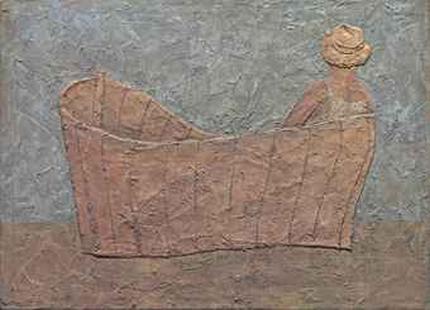
Domenico Gnoli
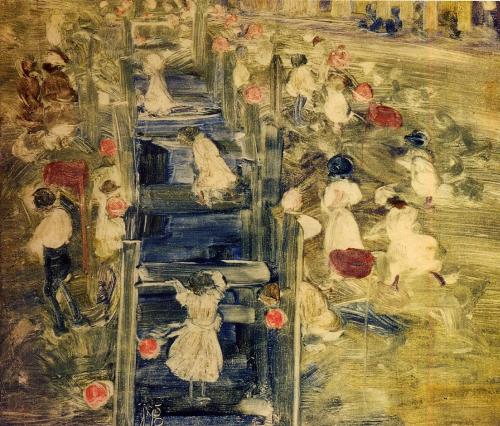
The Race
c.1895
Maurice Prendergast
1858 - 1924
_______________________
Beckett and the Movement of Sense: Texts for Nothing
Mark Bowles
Piccolo
(....)
By 'bubbles of sense- no sooner formed than dissolved, retracted' - i mean passages like this:
When I think, no that won’t work, when come those who knew me, perhaps even know me still, by sight of course, or by smell, it’s as though, it’s as if, come on, I don’t know, I shouldn’t have begun.
Sense stutters, barely emerging before collapsing in the ‘murmur':
Name, no, nothing is nameable, tell, no, nothing can be told, what then, I don’t know, I shouldn’t have begun.
Or words scramble breathlessly to replace each other, gasping for air:
It’s a winter night, where I was, where I’m going, remembered, imagined, no matter, believing in me, believing it’s me, no, no need, so long as the others are there, where, in the world of others, of the long mortal ways...
But there are also pools or eddies of sense images, memories, fictions.. The image of Mother Calvet foraging in the garbage (Text ii), quickly drawn characters or brief grotesques from the world of Dublin betting shops and republican politics (Text iii), the hand-drawn itinerant companions – “I’ll have a crony, my own vintage, my own bog, a fellow warrior,” “Vincent arriving in sheets of rain”(Text iii), like the flotsam of other lost fictions, brief wrecks of beauty, the narrator’s own creatures - offering the brief promises of embodiment (“To be bedded in that flesh or in another”).... all of these inhabit only a conditional tense, all are dispersed in the flow of the prose. This flow and movement are the basic facts of the prose - the way in which sense collects, reforms, breaks up, and the cadence and affect which is absolutely immanent to this movement. We would need to look at how movement modifies or defies sense. For example "name, no, nothing is nameable, tell, no, nothing can be told" has a sense, clearly, but running through it is a little lullaby of negatives sung to the absent self. Or the various motifs (e.g. “When come those who knew me, Text xi) – where each reoccurrence of the motif, regardless of its content, is a kind of affirmation, a persistence, a rising again to the surface where sense is sinking. The flashes of sense that jump and fizzle, the repetitions, the divisions and splitting of the “I” in the ebb and flow, the I turning into He as soon as uttered (Text x, for example: "I've slept, He's slept") .. all this constitutes a movement traced on the mind of the reader like a breeze on water.
...(more)
_______________________
With My Dog Eyes by Hilda Hilst
reviewed by
Nicholas Lezard
(....)
In With My Dog Eyes we have a middle-aged man, Amós Kéres, a professor of mathematics, who is being asked to take a break from teaching because he has fallen into the habit of saying nothing for 15 minutes at a stretch. So far, so intelligible; but after a few pages – and there are only 59 of them in the whole work – we leave the pathways of conventional narrative. Let me give you a taste:
There are certain walls that should never be seen before we grow old: moss and ocher, dahlias across some of them, lacerated, sounds that should never be heard, pulsations of a lie, the metallic sounds of cruelty echoing deep down into the heart, words that should never be pronounced, hollow eloquences, the vibrations of infamy, the throbbing ruby-reds of wisdom.
If you think this sounds like the word salad produced by certain kinds of insanity, you'd be getting somewhere. (....)
... she makes the monologues in Beckett's The Unnamable and Molly Bloom's soliloquy at the end of Joyce's Ulysses look like models of linear, expositionary clarity.(....)
So here you go: this is the heavy stuff, literature as an assault course, not for the impatient or faint-hearted, or those who suspect they're having their legs pulled. Look on it as not so much a novel as an extended prose poem, written from the edge.
...(more)
_______________________

Maurice Estève
b. May 2, 1904
_______________________
The Lonely Word: Three Poems by Liu Xia
words without borders
Word
Liu Xia
Translated from Chinese by Ming Di and by Jennifer Stern
In the morning, a word
from someone else's
dream peeks at me
like a conspiracy.
The minute I open my eyes
the word,
with an elegant gesture,
takes me.
The lonely word
is a terminal patient:
pain and screaming,
possibly lethal.
But I’m envious—it flies up
the minute it takes me.
...(more)
_______________________
A Philosophy of Walking by Frédéric Gros
reviewed by James Attlee
(....)
Walkers, and those who have written about walking, tend to fall into two camps: urban flâneurs, descendants of Baudelaire and the Situationists, and those striking out into the countryside in the footsteps of Rousseau, Thoreau and Edward Thomas. So far, so pedestrian. Several histories of walking and its relation to literature exist already and our bestseller lists are regularly topped by ambulatory writers repackaging their journeys for a sedentary audience. What then can Gros, a professor of philosophy from Paris, add to our understanding? Inevitably there is crossover in his selection of authors and philosophers from the past who have been advocates of walking with other such studies such as Rebecca Solnitt's Wanderlust.
However, his perspective does add something to Anglophone commentaries, for instance in his insight into new and old world attitudes to nature. For a European, he points out, a journey into the wilderness is a return to an ancient, ancestral home, while for a North American like Thoreau it represented the future. Gros is a practitioner as well as a theorist, by choice a member of the rural walking school, claiming that navigating the city on foot is "torture to the lover of long rambles in nature because it imposes...an interrupted, uneven rhythm".
...(more)
_______________________
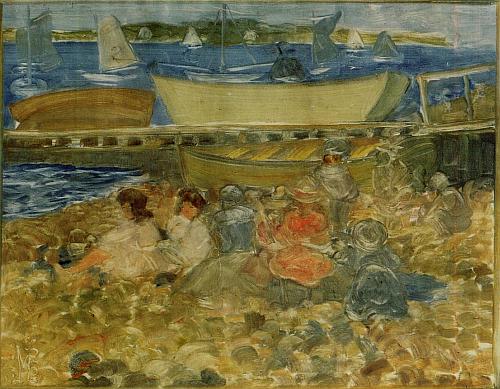
Shipyard Children Playing
c.1900
_______________________
Capitalism Works… but that's not the problem
Joshua Moufawad-Paul
M-L-M Mayhem!
(....)
... capitalism works very well according to its intrinsic logic and that is this logical working-out of capitalism that needs to be rejected: it works and what it accomplishes is its problem, not its failure to accomplish its logical aims. Although this annoyance is mainly driven by some desire for philosophical precision, and thus carries problems that might be distant from the tactical use of the discourse, I do feel that is for the most part justified.
To be fair, when some people raise the slogan "capitalism isn't working" they are not arguing that there is a gap between capitalism's logic and implementation. Usually they mean that capitalism isn't working for people, that it is not working in the service of humanity as a whole. Sometimes they might be attacking the most asinine capitalist ideology––the kind alienated libertarians espouse––that claims that capitalism will indeed "work" once everything is privatized. (As I pointed out elsewhere, however, no successful capitalist actually believes this fantasy!) In this sense, to claim that capitalism does not work is to imply that it can never work because it doesn't do anything useful for humanity as a whole, nor will it ever do so, and so must be replaced by a system that does work. Again, fair enough on this count; it is easy to understand and sympathize with the intention of the discourse when it is used in this manner.
And yet I feel that the imprecision of this discourse is such that, regardless of the intentions of those who use it from time to time, it is never confined to the above meaning.(....)
At least the assertion that "capitalism doesn't work" possesses some discursive confusion. To claim that it is broken, however, is to simultaneously claim that there was a period when it was not broken and that it worked differently in this unbroken state. Moreover, that which is broken can be fixed. The solution to the social problems encountered under capitalism, then, is one that will make every social democrat happy: the problem is that capitalism, like the untended nature of Milton's paradise, is "out of control" because we haven't worked hard enough to make it work properly; the answer is to simply tinker with capitalism, some form of neo-Keynesianism, and the problem is solved!
(....)
Capitalism is obsolete, but things that are obsolete still work––hell, I wrote my entire dissertation on one of the original iMac desktop computers (you know, the ones that looked like candy?) that was woefully out of date but still worked. Capitalism is cancerous, but nobody would accuse cancer for not working because it was malignant––this is, in fact, precisely how cancer functions as cancer. Capitalism is not broken but it breaks us… which is why, in the end, it needs to be broken.
...(more)
_______________________

Maurice Estève
Otoliths issue thirty-three
_______________________
Words without Borders May 2014
Taboos: New Dutch and Flemish Writing
This issue presents writing by Dutch and Flemish writers exploring the intrusion of the forbidden, the illegal, the unspoken into people’s lives and homes. What fears and taboos reside there? What do people regard as improper? What are the things that can’t be mentioned? In a society that encourages individual expression, characters struggle to cope with their freedoms. How do you deal with yourself and others when it seems as if everything is possible and everything is permitted? And is that in fact the case?
|





























